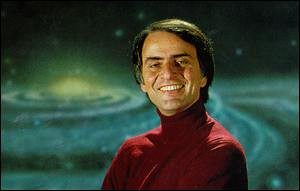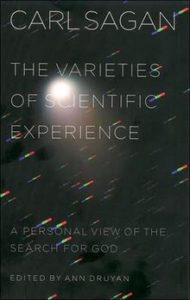Dr. Carl Sagan was one of the most prominent scientists of the twentieth century, and likely will be one of the most remembered and frequently quoted in the twenty-first and beyond. He was well-credentialed in the scientific disciplines of microbiology and astronomy and left us a library of his thoughts and perceptions on both. Although I never had the opportunity to meet the man in person, I am privileged to say that I have read all of his books and each and every one of them in its own right conveys not only a wealth of scientific information but the profound sense of understanding manifest in the sagacious enterprise of this magnificent human being. I think it is safe to say here that anyone who could come up with the title “Atheist profile: Carl Sagan,” did not know him or have any sense of what he believed, or didn’t believe for that matter.
 Carl Sagan as agnostic
Carl Sagan as agnostic
Even Richard Dawkins, perhaps the most celebrated atheist of our times, in his book “The GOD Delusion,” portrays Carl Sagan as agnostic, but not an atheist. Dawkins has made well known his contempt for Carl Sagan’s “fence-sitting,” with respect to the matter of God’s existence. Sagan was a scientist and devout skeptic for sure, requiring that claims of extraordinary manifestations be supported by equally extraordinary evidence, but to call this brilliant human of superior intellect an atheist, seems to me and I’m sure to others who know what he was about, to be a statement of disrespect and ignorance. No, Carl Sagan was not an atheist, of that I am sure, but did he believe in the existence of God?
Carl Sagan’s Death
Carl died in 1996, and can not answer this question for us today. You could read all of the books written by Carl and published during his lifetime, but I don’t think you will find an answer to this question in them either. But there may be one source of information that can give us a few clues to the resolution of this enigma.
Science and Belief
In 1985, Dr. Sagan gave a series of talks in Scotland known as the Gifford Lectures. Carl responded to a spectrum of questions on science and belief including those of a religious nature. In 2006, to commemorate the tenth anniversary of Carl’s death, his widow, Ann Druyan, compiled and edited the Gifford Lectures into a volume titled: “Carl Sagan, The Varieties of Scientific Experience, A Personal View of The Search For God.”
 It is quite an interesting piece of work and for the purpose of this discussion I would direct your attention to the chapter in it titled “The God Hypothesis.” Anyone at all familiar with Carl’s writing knows that he was well-schooled in the works of Greek antiquity, and it is by no coincidence therefore that Carl would end this chapter with a quotation from the 5th century philosopher Protagoras: “Concerning the gods, I have no means of knowing whether they exist or not or of what sort they maybe, because of the obscurity of the subject, and the brevity of human life.”
It is quite an interesting piece of work and for the purpose of this discussion I would direct your attention to the chapter in it titled “The God Hypothesis.” Anyone at all familiar with Carl’s writing knows that he was well-schooled in the works of Greek antiquity, and it is by no coincidence therefore that Carl would end this chapter with a quotation from the 5th century philosopher Protagoras: “Concerning the gods, I have no means of knowing whether they exist or not or of what sort they maybe, because of the obscurity of the subject, and the brevity of human life.”
Protagoras was an agnostic because he simply did not know one way or the other, and Carl here uses Protagoras’s words to echo his own thoughts. Perhaps Ann Druyan puts it best in her Editor’s introduction to the book: “He believed that the little we do know about nature suggests that we know even less about God.” I, of course, have read the book, but if you would truly like to know what Carl believed about God and religion, then I suggest you read it too.






